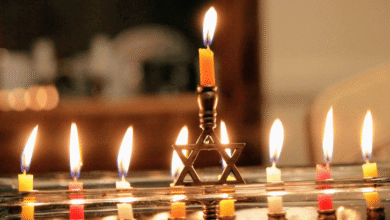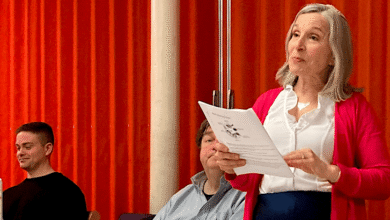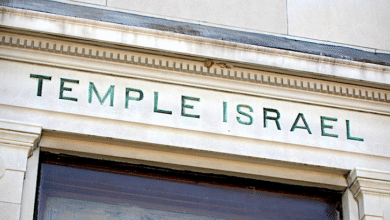We need not justify our emotions, but maintain our humanity in the face of pain and sadness – United Hebrew Congregation Terre Haute

For the past few weeks or so, like many American Jews, I’ve been feeling increasing amounts of worry.
I worry for specific individuals I know in Israel, about innocent people just trying to live their lives, about how the situation in the Middle East will affect global antisemitism.
When I was working with a religious school in Dresher, Pa., in 2015, I taught a high school class about Israel.
We talked through methods of navigating these situations in a manner that would uphold their personal beliefs while also combatting the antisemitic subtext inherent in such lines of inquiry.
I remember talking to my students about antisemitism and Israel. I told them they would be expected by the non-Jewish public, as Jewish young adults, to have a high degree of understanding about the conflicts in the Middle East, and they might even be expected to justify their beliefs or legitimize their Judaism by speaking about Israel in a specific way.
We talked through methods of navigating these situations in a manner that would uphold their personal beliefs while also combatting the antisemitic subtext inherent in such lines of inquiry.
At the time, the students didn’t really believe these things would come up, but during the past few weeks I have heard otherwise from some of those students, now in college.
The worry is all-encompassing
Simultaneously, I’ve seen a lot of people qualifying their emotions. Even in times of greatest despair, we feel the need to assure people of our politics. We have to earn the hurt we feel. We have to assure others of our political standing before we can talk about anything else.
We’re mourning, we’re going through a trauma, we’re watching our loved ones in Israel suffer, we’re watching our fellow Jews suffer.
We’re watching Palestinians suffer and we’re watching a war emerge that will devastate civilian lives.
We’re watching horrors unfold right before our eyes, the likes of which are nearly impossible to imagine.
I am not able to put into words the depth of the worry and fear that I’ve encountered these last few weeks, or that I’ve seen reflected back at me.
But we shouldn’t have to justify ourselves right now. The worry is all-encompassing, and it is inexplicable.
I am not able to put into words the depth of the worry and fear that I’ve encountered these last few weeks, or that I’ve seen reflected back at me.
And truly, we need to be in contact with the emotions we’re feeling when faced with human suffering. We do not need to make those emotions palatable.
We are grieving, we are angry, we are experiencing a bone-deep sadness. The emotions we feel, the despair, are our reminder that we are human.
We are grieving, we are angry, we are experiencing a bone-deep sadness. The emotions we feel, the despair, are our reminder that we are human.
They remind us that we care about the sanctity of human life, that we cannot stomach this devastation, this unrelenting cruelty, this extreme loss.
The truth of the matter is that we are human, and we should not have to get caught up in the qualifications of our own emotions over the loss of human life.
Sisera’s mother waits by the window
In the book of Judges, we read about an act of extreme violence. Yael, wife of Chever the Kenite, drives a tent peg through the head of Sisera, the enemy general.
In Judges 5, a triumphant poem about a wartime victory, we read that Yael will be proclaimed and esteemed among women for this act of violence. Then, this subversive poem redirects our attention away from this supposed glory to Sisera’s mother.
Sisera is defeated and killed, but we are told his mother waits at the window, wailing, crying, telling herself little white lies about why it is taking him so long to return. We go beyond the enmity, and enter a realm of empathy for a weeping mother.
As events unfold in the Middle East, we will see qualifications for our sadness. We will see justifications for violence. We will see discussions of death in cruel and unfeeling manner.
As events unfold in the Middle East, we will see qualifications for our sadness. We will see justifications for violence. We will see discussions of death in cruel and unfeeling manner.
When we do, I will recall the image of a loved one waiting at a window, wailing and crying out for the person for whom they wait.
That is how we maintain our humanity in the face of this pain, by listening to the honesty in our own emotions and exhibiting them without qualification.
Sort of an Apocalypse
The man under his fig tree telephoned the man under his vine:
“Tonight they definitely might come. Assign
positions, armor-plate the leaves, secure the tree,
tell the dead to report home immediately.”
The white lamb leaned over, said to the wolf:
“Humans are bleating and my heart aches with grief.
I’m afraid they’ll get to gunpoint, to bayonets in the dust.
At our next meeting this matter will be discussed.”
All the nations (united) will flow to Jerusalem
to see if the Torah has gone out. And then,
inasmuch as it’s spring, they’ll come down
and pick flowers from all around.
And they’ll beat swords into plowshares and plowshares into swords,
and so on and so on, and back and forth.
Perhaps from being beaten thinner and thinner,
the iron of hatred will vanish, forever.
Student Rabbi Rocki Schy will serve UHC Terre Haute during the 2023-24 academic year.




